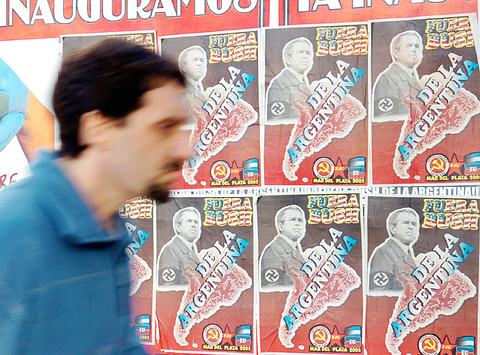If US President George W. Bush is expecting some respite from his troubles at home during a four-day visit to Argentina and Brazil that begins today, he is in for a very rude awakening.
Polls show Bush to be the most unpopular US president ever among Latin Americans, and thousands of demonstrators, led by the soccer idol Diego Maradona, are flocking to the Argentine beach resort of Mar del Plata to protest his presence at a summit meeting of Western Hemisphere leaders. The greeting from his fellow heads of state, who have been complaining of his administration's neglect of the region for five years, does not promise to be especially warm, either.
"He doesn't have any money to offer, so the president doesn't really have any cards to play," said Riordan Roett, director of the Latin American studies program at the Johns Hopkins School of Advanced International Studies. "Nobody among the crop of fiscally conservative but socially progressive presidents that we now have around the region is going to go to his defense."

PHOTO: AFP
The theme of what is formally known as the Fourth Summit of the Americas is "Creating Jobs to Fight Poverty and Strengthen Democratic Governance." But the feeling among many Latin Americans is that the US is coming with little to offer other than the usual nostrums about free trade, open markets, privatization and fiscal austerity, the same recipe of reforms that has vastly increased social inequality throughout Latin America over the past decade.
"We've almost all of us been down that road, and it didn't work," said a diplomat from one South American country, speaking on condition of anonymity so as not to offend the Bush administration. "The United States continues to see things one way, but most of the rest of the hemisphere has moved on and is heading in another direction."
Even in the area of free trade, which Washington continues to offer as the solution to the region's problems, progress has slowed to a crawl. Washington recently struck such an agreement with Central American nations, but the deadline this year for a much broader hemispheric accord, set at the first summit meeting in Miami in 1994, has come and gone.
Moreover, while Latin America had one of its better economic performances last year, much of that growth came from booming sales of raw materials to China.
"The pace of free trade negotiations has slowed down," but not "the commitment to some kind of broader hemispheric agreement," Thomas Shannon, the US assistant secretary of state for inter-American affairs, said on Tuesday in a telephone interview from Washington.
"We don't see any dramatic stepping away" from the notion that "democracy and free markets really do deliver the goods," he added.
Latin American diplomats, however, say that negotiations over a joint text to be issued at the end of the three-day meeting have been fraught with disagreement. The Bush administration and Canada have been pushing for a resounding endorsement of the free-trade message. But Latin America, with Venezuelan President Hugo Chavez particularly scathing in his condemnations has been resisting.
also see story:
No escape for unpopular Bush

Auschwitz survivor Eva Schloss, the stepsister of teenage diarist Anne Frank and a tireless educator about the horrors of the Holocaust, has died. She was 96. The Anne Frank Trust UK, of which Schloss was honorary president, said she died on Saturday in London, where she lived. Britain’s King Charles III said he was “privileged and proud” to have known Schloss, who cofounded the charitable trust to help young people challenge prejudice. “The horrors that she endured as a young woman are impossible to comprehend and yet she devoted the rest of her life to overcoming hatred and prejudice, promoting kindness, courage, understanding

US President Donald Trump on Friday said Washington was “locked and loaded” to respond if Iran killed protesters, prompting Tehran to warn that intervention would destabilize the region. Protesters and security forces on Thursday clashed in several Iranian cities, with six people reported killed, the first deaths since the unrest escalated. Shopkeepers in Tehran on Sunday last week went on strike over high prices and economic stagnation, actions that have since spread into a protest movement that has swept into other parts of the country. If Iran “violently kills peaceful protesters, which is their custom, the United States of America will come to

‘DISRESPECTFUL’: Katie Miller, the wife of Trump’s most influential adviser, drew ire by posting an image of Greenland in the colors of the US flag, captioning it ‘SOON’ US President Donald Trump on Sunday doubled down on his claim that Greenland should become part of the US, despite calls by the Danish prime minister to stop “threatening” the territory. Washington’s military intervention in Venezuela has reignited fears for Greenland, which Trump has repeatedly said he wants to annex, given its strategic location in the arctic. While aboard Air Force One en route to Washington, Trump reiterated the goal. “We need Greenland from the standpoint of national security, and Denmark is not going to be able to do it,” he said in response to a reporter’s question. “We’ll worry about Greenland in

PERILOUS JOURNEY: Over just a matter of days last month, about 1,600 Afghans who were at risk of perishing due to the cold weather were rescued in the mountains Habibullah set off from his home in western Afghanistan determined to find work in Iran, only for the 15-year-old to freeze to death while walking across the mountainous frontier. “He was forced to go, to bring food for the family,” his mother, Mah Jan, said at her mud home in Ghunjan village. “We have no food to eat, we have no clothes to wear. The house in which I live has no electricity, no water. I have no proper window, nothing to burn for heating,” she added, clutching a photograph of her son. Habibullah was one of at least 18 migrants who died